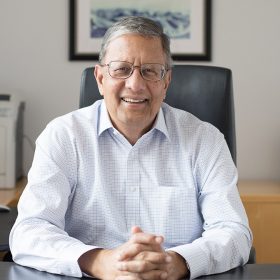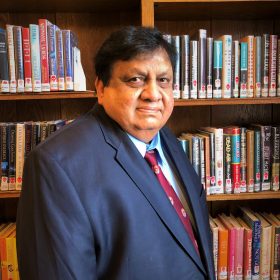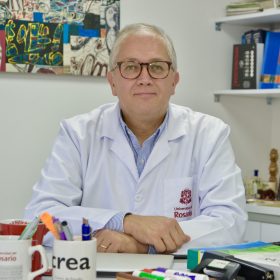AESKU Award
Lifetime Contribution to Autoimmunity Awards, 2020
We are pleased to announce that following the tradition, three distinguished personalities have been chosen to receive the “Lifetime Contribution to Autoimmunity Award” in 2020. This award is presented every two years at the Autoimmunity Congress as a recognition to individuals who have contributed in a significant way to the field of autoimmunology.
THIS YEAR’S RECIPIENTS

Abul Abbas, MD
Dr. Abbas received his medical degree (MBBS) in India, completed training in Pathology at Harvard and joined the faculty at Harvard Medical School and the Brigham and Women’s Hospital, where he rose to become Professor of Pathology and Head of the Immunology Research Division.
In 1999, after twenty years on the Harvard faculty, he moved to the University of California San Francisco as Professor and Chairman of the Department of Pathology.
Dr. Abbas has received several honors, including election to the National Academy of Medicine, election as a Fellow of the American Academy of Arts and Sciences, and the Rous-Whipple Award and Robbins Educator Award of the American Society of Investigative Pathology. He has served as one of the founding Editors and Associate Editor of Immunity, Associate Editor and Section Editor for The Journal of Immunology, Associate Editor of Cell, Consulting Editor of The Journal of Clinical Investigation, founding Editor of the Annual Review of Pathology: Mechanisms of Disease, and Co-Chief Scientific Advisor for Science Immunology. From 2011-2013, he was the President of the Federation of Clinical Immunology Societies (FOCIS).
Dr. Abbas’ research interests are in Immunology, with a focus on the control of immune responses and the causes of autoimmunity. He has published over 200 peer-reviewed papers and invited reviews, and is the author of four widely read textbooks, two in Immunology and two in Pathology. He has taught Immunology at Harvard Medical School and UCSF, received numerous teaching awards at both institutions, and has organized and taught Immunology courses worldwide.

A Razzaque Ahmed, MD, DSc, MPA
Abdul Razzaque Ahmed is a Professor of Dermatology at the Tufts University School of Medicine and the Director of the Center for Blistering Disease in Boston. It is the only Center of its kind in North America. He graduated from the All-India Institute of Medical Sciences, New Delhi, India. He immediately migrated to the US where he did his residencies in internal medicine, dermatology, and clinical allergy & immunology. He received a Doctorate of Science degree in Molecular Immunology from the Faculty of Medicine of Harvard University. He earned a Masters in Public Administration from the Kennedy School of Government of Harvard University.
Some of his major contributions to the pathobiology of autoimmune blistering diseases include identifying the MHC Class II genes associated with pemphigus, pemphigoid and dermatitis herpetiformis. He demonstrated that haplo-identical first-degree relatives of patients with pemphigus vulgaris produce low titers of autoantibody of a different IgG subclass that binds to a nonpathogenic epitope. He was the first clinician scientist to describe pathogenic IgG4 and nonpathogenic IgG1 autoantibodies in pemphigus vulgaris patients. He identified human beta4 and alpha6 integrin subunits as pathogenic autoantigens in mucous membrane pemphigoid and also identified disease-related epitopes by in vitro tissue culture studies and in vivo in Balb/c mice.
He is a pioneer in the use of biologics in treating autoimmune blistering diseases. Unlike his predecessors who often emulated protocols used in rheumatological diseases, he developed unique protocols for patients with autoimmune blistering diseases based on science and evidence. Amongst his many clinical contributions, the most important, relevant and universally beneficial are the use of intravenous immunoglobulin (IVIg) and the combination of IVIg and rituximab in treating patients with recalcitrant autoimmune blistering diseases. This combination treatment results in long-term, 15 years or more, sustained clinical remissions, without need for additional systemic therapy (NEJM 2015; 373: 2693-4). In patient with ocular cicatricial pemphigoid these novel and specific protocols that he has developed have prevented blindness.
He has received many Lifetime Achievement Awards from scientific organizations and dermatology societies of many countries. Some of these are the Pan-Arab League, India, Turkey, Italy, Tunisia and Portugal, amongst others. The International Pemphigus and Pemphigoid Foundation bestowed upon him the “Doctor of the Year” Award in 2012. In 2016 he was the recipient of the “Walter Lever Memorial Lecture Award” presented by the Tufts University School of Medicine Department of Dermatology. It is given once in 25 years to an individual whose contribution has been readily duplicated and a contribution that has distinctive and meritorious impact. He has received the William Gies Award from the International Association for Dental Research and the Hermann Pinkus Award by the American Society for Dermatopathology.
Several premed students who worked in his lab became physicians. Medical students, residents and postdoctoral fellows who worked in his lab are now senior scientists in the pharmaceutical industry or have become full professors at various medical schools. He has been a role model, mentor and teacher who has shaped the future of many young men and women.
He is the President of a nonprofit organization (NPO) in India referred to as nongovernmental organization (NGO) locally. It provides completely free education at a college level in Humanities, Business and Law to young men and women from poor families, ghettos, beggar colonies and economically underprivileged groups. This education transforms their lives and opens the doors for a new and bright future.
Dr. Ahmed’s work has created milestones in medicine. His service to the community is a legacy that will continue to touch and transform many lives. He has provided hope to his patients and facilitated long-term recovery from potentially fatal diseases. In the life of poor young people living in darkness and despair he has brought light, hope and progress.

Juan-Manuel Anaya, MD, PhD
Juan-Manuel Anaya is Professor of Medicine and Director of the Center for Autoimmune Diseases Research (CREA) at the Universidad del Rosario, in Bogotá, Colombia.
Prof Anaya received his M.D. degree from the Medical Faculty of Universidad del Rosario, in Bogota, Colombia. He developed his Residency in Rheumatology at the University of Paris V, France, and obtained a Postgraduate Diploma in Immunology at the Institute Pasteur of Paris. He served as “Chef de Clinique” at the Gui de Chaulliac Hospital, University of Montpellier, France. At the Clinical Immunology Division, Department of Medicine at the University of Texas Health Science Center in San Antonio, TX, USA, he performed as a Postdoctoral Research Fellow. He received his Ph.D. degree in Biology from the University of Antioquia, Colombia.
Prof Anaya’s research is focused on the search and discovery of common mechanisms of autoimmune diseases (that is, the autoimmune tautology). He has coauthored more than 300 scientific papers and coedited 15 books on immunology and autoimmunity. Prof Anaya is the founder and coordinator of the Chair of Translational Medicine at the School of Medicine of the Universidad del Rosario, and co-editor of the Journal of Translational Autoimmunity. He is member of the National Academy of Medicine.
He is devoted to his family, Andrea Schmidt, his wife, and children Lucas and Simon.
